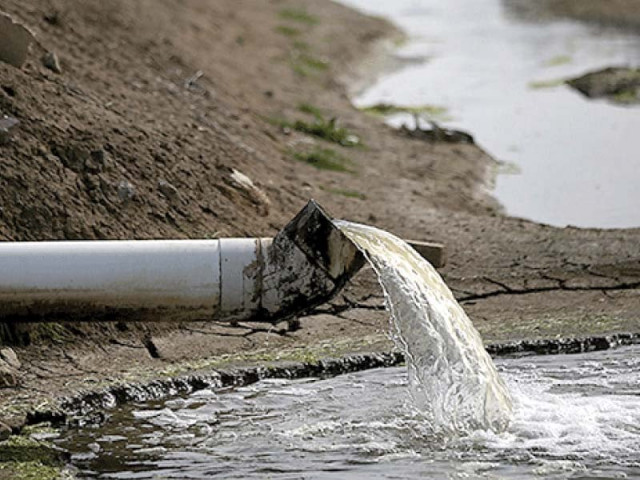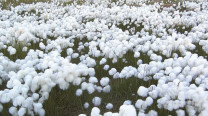‘Water efficiency is a necessity’
Experts say agriculture sector uses over 90% fresh water, but wastes 50%

Pakistan is experiencing frequent and severe climate change-induced natural disasters. The country has a long history of battling droughts and floods. Despite contributing less than 1% of global carbon emissions, the country is still grappling with the effects of climate change.
Agriculture is the largest consumer of freshwater in Pakistan, using over 90% of the resource, but mismanagement has led to almost 50% of water being wasted.
While there may be little the country can do, relative to advanced economies, to mitigate the chances of such calamities increasing, it can progress by leaps and bounds by adopting water resource management strategies from these progressive countries. The unavailability of sufficient usable water resources can lead to food security issues in an agriculture-based economy with a burgeoning population.
Speaking to The Express Tribune, Concave Agri Services President, Muhammad Ali Iqbal said, “Pakistan is losing its two biggest water reservoirs: glaciers and underground water.” With “mind boggling” usage of water by the sector, it is key to launch an awareness campaign to ensure that farmers use water resources appropriately.
“Due to outdated farming techniques, irrigation is still done using the older flood irrigation technique – wasting more than 50% of water resources,” he said, adding that drip irrigation, sprinklers, and other smarter technologies can help the farming community use water more efficiently.
Iqbal emphasised that smarter technologies, like drip irrigation and sprinklers, can help the farming community, especially in Sindh and K-P, to make use of this precious resource judiciously. Digital solutions can also be introduced to monitor water usage, as in other countries, instead of using decades-old manual irrigation methods. Moreover, it is becoming evident that the over-usage of water for irrigation purposes not only makes the water table go down but also causes serious damage to soil health, affecting the productivity of the agriculture sector.
According to Mahmood Nawaz Shah, Senior Vice President Sindh Abadghar Board (SAB), some of the 50% lost water is natural, while some is not accounted for as it is used illegally.
Pakistan’s multinationals are helping conserve water by improving water use efficiency in their direct agricultural supply chain.
Nestlé Pakistan launched its Water Pledge in 2021, which focuses on agriculture, factories, and communities, and aims to improve water use efficiency in its direct agricultural supply chain. Through this initiative, around 205 acres of land was covered, starting from districts around Sheikhupura and Kabirwala, while sensors were installed on another 455 acres, resulting in an estimated savings of a cumulative 368,000 cubic meters of water in 2021.
“In addition to these numbers, in 2023, we plan to expand drip irrigation to up to 100 acres of land, working with farmers in Sindh for the first time,” said Rahat Hussain, Spokesperson for Nestlé Pakistan.
Nestlé has partnered with the Government of Punjab and LUMS to install drip irrigation mechanisms and Smart Soil Moisture Sensors respectively, over hundreds of acres of farmlands in Punjab. The partnership aims to expand drip irrigation to 100 acres of land in Sindh in 2023. These sensors send moisture content reports to a digital cloud, enabling operators to know which locations require irrigation, allowing not only optimum levels of irrigation but also of crop yield.
Speaking to The Express Tribune, Agri Tourism Development Corporation of Pakistan Director of Information, Khawaja Mazhar raised concerns over the increasing contamination of fresh water due to sewerage water. He suggested that water highways and cemented channels must be built to avoid water seepage during the course. He also called for the adoption of water efficient crops such as beetroot instead of sugar cane and rice.
Mazhar emphasised the need for awareness to manage domestic water usage to tackle the water crisis. He stated, “In our cities, fresh water is contaminated by the sewerage water that is also considered lost water.”
Several corporations have already taken steps to tackle the issue of water usage, with Unilever’s Water Stewardship project being a prime example. The project has successfully cut water usage by 49%, and the company has also committed to launching sustainability programs in the 100 most vulnerable locations worldwide, including Pakistan.
Despite the alarming water crisis in the country, the private sector’s efforts have created a ray of hope that technological advancements will enable Pakistan to become an efficient user of its watershed and avoid destruction.
Published in The Express Tribune, March 29th, 2023.
Like Business on Facebook, follow @TribuneBiz on Twitter to stay informed and join in the conversation.



















COMMENTS
Comments are moderated and generally will be posted if they are on-topic and not abusive.
For more information, please see our Comments FAQ